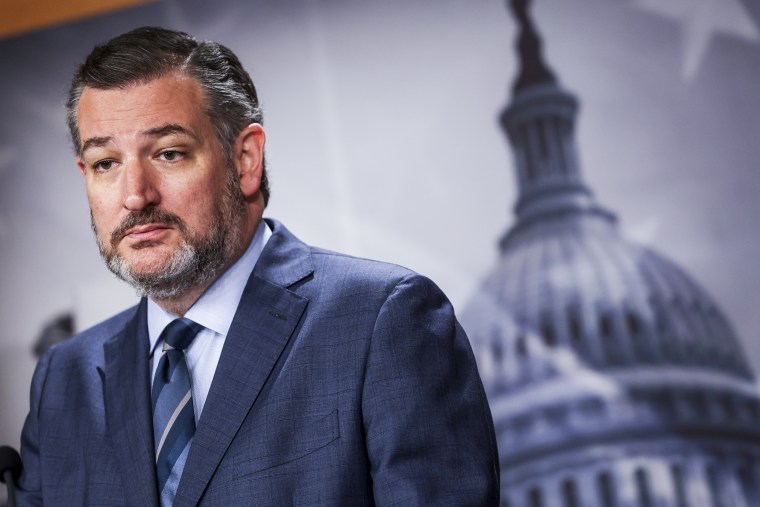WASHINGTON — Senate Republicans have fought for decades to end Roe v. Wade. Now, with victory in sight, they are discussing whether to pursue nationwide restrictions on abortion if they gain power.
"We need to discuss what the role of the federal government will be in this," Sen. Joni Ernst of Iowa, a member of the Republican leadership, told NBC News. "I know that states will enact different laws — that would likely happen should the deliberations go the way that everybody thinks they will."
Asked if Congress should restrict legal abortion across the country, Ernst responded: "We're debating now. We're going to continue to debate that. I think that's important that we do that, to debate it."
Sen. Ted Cruz, R-Texas, said the elimination of Roe v. Wade would kick the issue back to state legislatures and Congress, after a leaked draft indicated the conservative Supreme Court would overrule the landmark 1973 ruling that declared abortion was a right.
"I have supported numerous federal bills, and I'm sure there will be more pieces of federal legislation that are considered," Cruz said of nationwide abortion restrictions, adding that "contested policy issues" should be resolved through "democratically elected bodies."
The new discussion in the party comes as Republican-led states advance a host of restrictive laws, some of which would outlaw nearly all abortion, with no exceptions for rape or incest. Oklahoma and Texas have enacted prohibitions on terminating a pregnancy after six weeks. Some state lawmakers are pushing the bounds of the debate, with one Texas Republican calling for a bill that could subject women and doctors who perform abortions to the death penalty.
Sen. Kevin Cramer, R-N.D., said he expects a push for federal abortion restrictions.
“Just take my state of North Dakota. Having a North Dakota child killed in the womb in Fargo versus Moorhead, Minnesota, you know, on the other side of the Red River — I don’t find a lot of solace in that just because it didn’t happen in my state,” Cramer said. “I think you could expect that pro-life activists would push for federal protections. I mean, I wouldn’t take that off the table.”
Republicans pursued numerous restrictive abortion bills the last time they controlled the Senate, including a 20-week abortion ban in 2020 and in 2018. Each time, the bill gained a majority of senators but was blocked by the filibuster, and it was a symbolic vehicle for political messaging with no chance of becoming law.
But if Roe is scrapped, such a push would be more than symbolic and could go much further than a 20-week ban, which has prompted some jitters among top Republicans.
It’s unlikely that any legislation to outlaw abortion — or enshrine it nationwide — would gain 60 votes in the Senate in the near future. But a majority of senators can weaken or eliminate the filibuster.
Senate Minority Leader Mitch McConnell, R-Ky., vowed Tuesday to preserve the legislative filibuster if Republicans win the 2022 elections and elevate him to majority leader next year. “Absolutely,” he said when asked if he'd protect it at all costs. “We don’t want to break the Senate, and that’s breaking the Senate.”
Sen. Mike Braun, R-Ind., said there may be a future effort by Republicans to ban abortion federally.
“It’s kind of an academic point because I don’t think you’re going to get 60 votes to do either one,” Braun said after a closed-door GOP lunch meeting Tuesday. “They talked about codifying something along the lines of what we’d like, or the other way, but unless you breach the filibuster, I don’t think that’s going to happen.”
Numerous Senate Republicans say the push for abortion restrictions in a post-Roe country would be a states rights issue.
“I would rather have it be done in the states,” Sen. Cynthia Lummis, R-Wyo., said. “Chances are there will be some people who want to federalize it just because they strongly believe that there’s no justification for states to take different approaches. I just disagree with that.”
Sen. Mitt Romney, R-Utah, said he believes abortion laws are “best done at the state-by-state basis.” He added that any push to codify federal abortion restrictions would likely be futile.
“I think it’s unlikely you’re going to find everybody agreeing on a national measure. I think you’d see the elected representatives in each state make those decisions,” Romney said.
Sen. Josh Hawley, R-Mo., didn’t rule out federal action in the future.
“Would I support banning abortions at the federal level?” he said. “Out of the gate, I wouldn’t. I mean, I think let’s allow the people to weigh in on this, and we’ll have a big national discussion.”
Just 28 percent of voters said Roe v. Wade should be overturned, according to the latest Politico/Morning Consult poll. But Hawley said he’s “not sure about those numbers” because they don’t reflect the views of his constituents in ruby-red Missouri.
Sen. Bill Cassidy, R-La., said when asked whether there should be federal legislation restricting or banning abortions: “Do I think states, which are closer to the people being governed, would actually pay attention to the people being governed as regards these issues? And I think by and large, just in general, the closer someone is to those being governed, the better.”



